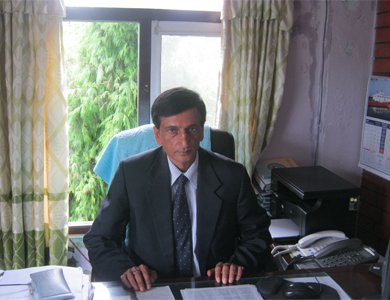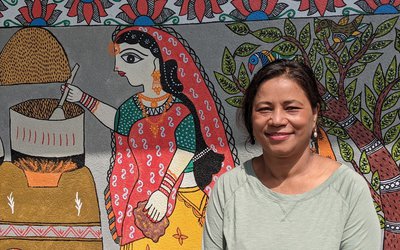
As the National Information Commission celebrated its seventh year since establishment last week, Shree Ram Panta, secretary at Information Commission, spoke to NEW SPOTLIGH on various issues. Excerpts:
How do you see the state of Right to Information now?
After the implementation of the Right to Information Act 2007, we can see a sea change now. Of course, there was certain confusion in the initial stage about some clauses and provisions of law. Everything has been settled now. In the initial years, only a few people knew it. When we do the retrospection of the last seven years, it is realized all over Nepal that RTI is important part of individual rights to seek the information they like to know. Interim Constitution of Nepal also guarantees the right to information as a fundamental right of the Nepalese citizens. Every Nepalese citizen has the right to seek the information under the Right to Information Act. The act also makes it clear that every individual can acquire the information related to public interest from public offices. Every individual has access to information stored in public offices. If we look at the last five years, the trend to demand information from public offices has gone up. In the first year, 12 applications were filed. In 2009, the commission received 39 complaints, in 2010 it was 47, in 2011 it was 136 and in 2012/013 it was 260. Out of them, we settled 11, 29, 22, 90 and 199 cases respectively. We are working to settle the remaining complaints. There is also an increasing tendency among the government offices to share information with the public. The situation is now that every Nepali can get information he or she seeks from the concerned offices. The government offices have to provide the information required by people. This is a very positive achievement of the last five years.
How do you classify them?
Out of total applications, the number is 68 for education,15 for health, 60 finance, 10 law, 13 local development, 9 security, 4 politics, 6 Information and communication, 8 CIAA, 10 banking, 39 civil servants and 19 others. Out of this, 68 per cent were related to public and 32 percent private.
How does the law define public institutions?
Constitutional bodies and institutions are established by law, the public institutions are established through law, political parties and organizations are established through law. Government undertakings, and non-governmental organizations which are directly and indirectly funded by Nepal government, foreign countries or international organizations, are also among these.
Under the Right to Information, can citizen seek all kinds of information?
It is not that citizen can get every bit of information. Right to Information Act has classified the information that people can get. The right has made it clear that every Nepali citizen can seek the information under the provisions of the act. The clause 3 of Act has provision which classifies the information with people's direct access and certain information as classified. The information related to Nepal's sovereignty and integrity, national security, information directly affecting criminal investigation and information against social harmony are under classified information. The classified information also includes individual's privacy, security and health. Nepal's monetary policy, patent rights and other such important information are under classified. However, one has to take decision showing reasonable justification.
How can the commission make a balance between individual privacy, state security and other secret information and right to information of citizens?
This is a major challenge. Even developed countries are facing a tough time to interpret the access to information of individuals and states. Nepal is no exception. There is a serious debate going on to have a fine balance between state's security needs and privacy of individual freedom and Right to Information. Even Nepal's Interim Constitution has put certain restrictions on sharing information particularly on the issue of Nepal's national interest and individual's privacy. The constitution guarantees individual privacy. One of the challenges in Nepal is to make a balance between these two. In the name of national security and individual privacy, the citizen should not be denied his or her right to information. At the same time, there is also the need to draw the border line for individual privacy and national security.
Since the area of Right to Information is so broad, how do you see the institutional capability of the National Information Commission?
When it was constituted in 2008, there were three commissioners, including the chief commissioner. However, the tenure of the commissioners has completed. Due to legal provisions, the commissioners cannot be appointed without the election of the Constituent Assembly. Despite the vacancy of the commissioner, the commission is committed to protect and promote the right to information. As a secretary, the government has now assigned me to look at the commissioner’s functions until the new appointment. The commission has very limited manpower and resources. However, the commission has been doing its best to uphold and protect the rights of the Nepalese citizens. As I have mentioned, the commission is able to generate awareness among Nepalese citizens about the importance of public information. At a time when there is a gradual increase in the awareness level among citizens, the commission has been making every effort to strengthen its institutional capabilities to protect citizen's right. We are now in the process of reviewing our organizational strength and capability to meet the needs of the people. We need to increase the resources and capabilities of the individuals
- TANAHU HYDROPOWER PROEJCT: A Significant Achievement
- Apr 15, 2024
- AMBASSADOR HANAN GODAR: Sharing Pain With A Nepali Family
- Mar 30, 2024
- VISIT OF KfW AND EIB TO NEPAL : Mission Matters
- Mar 25, 2024
- NEPAL BRITAIN SOCIETY: Pratima Pande's Leadership
- Mar 24, 2024
- NEPAL ARMY DAY: Time To Recall Glory
- Mar 15, 2024
















